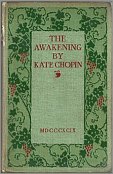 On August 26th, the United States observed the ninetieth anniversary of the nineteenth amendment, which granted women the right to vote. It is interesting to look back into history to a time when this right was only available to the privileged few. For seventy-two years, women all across the nation and around the world fought long and hard for equal privileges and freedoms as men. During this time, of course, women authors were just beginning to put their thoughts on the entire situation into print, in the hopes of raising national and global awareness to the unfair and unjust treatment of which they were subjected to. One woman author’s efforts that stand out above everyone else’s are those of Kate Chopin.
On August 26th, the United States observed the ninetieth anniversary of the nineteenth amendment, which granted women the right to vote. It is interesting to look back into history to a time when this right was only available to the privileged few. For seventy-two years, women all across the nation and around the world fought long and hard for equal privileges and freedoms as men. During this time, of course, women authors were just beginning to put their thoughts on the entire situation into print, in the hopes of raising national and global awareness to the unfair and unjust treatment of which they were subjected to. One woman author’s efforts that stand out above everyone else’s are those of Kate Chopin.
Kate Chopin (1850-1904) was an American author who sought to bring to light the devastating circumstances that women experienced, of inequality and role dictation in society and in the home. Though Chopin was fortunate to be married to a man who respected her need for independence and who willingly gave Chopin the opportunity to express herself, his abrupt death left her and her small children alone in a world that was cynical and unrelenting towards independent women. To support her struggling family, Chopin began to earnestly write stories, novels, and essays. Her work was well received until the publication of The Awakening, which sparked much controversy and abuse from narrow minded critics.
The Awakening (1899) portrays the life of a conventional housewife, Edna, who slowly gains independence and autonomy in the world due to a negligent husband and the lure of greater and happier things that are just beyond her reach in her molded and restricted life. In her journey towards freedom, Edna goes so far as to move into her own home without her husband, and to proceed to engage in repeated affairs, all the while ignoring not only her husband, Léonce, but her several young children. While the literary critics of Chopin’s time had until this point been lenient and accepting of her works, once The Awakening was released, Chopin found herself the unhappy recipient of much criticism, and debasement. Though Chopin possessed a beautiful gift of writing that vividly placed the reader into each particular scenario that she had conjured up, once The Awakening was so cruelly rejected, Chopin ended her writing career, and resorted to a life of great depression and despondency. She died of a brain hemorrhage in 1904, at the young age of fifty-four.
It is tragic that Chopin’s work was so cruelly rebuffed and turned down, when she was only depicting the acute unhappiness that so many women around her experienced in their limited and restricted lives during a time of strictly enforced inequality. It is certainly safe to say that The Awakening singlehandedly quelled not only Kate Chopin’s literary career, but her entire life as well. Today, the world has obviously strode much farther towards worldwide recognition and respect for the female sex, and The Awakening has since received much acclaim and attention, as it is now considered to be one of the most influential works devoted to the feminist movement, closely following in the steps of the work of Wollstonecraft. In the rare book market today, first editions of The Awakening are being sold for anywhere between $8,000 and $15,000. It is certainly a shame that Chopin died an unhappy and discriminated woman due to a book that is now much beloved and hailed as a cornerstone in the feminist movement.
In the midst of a much freer and democratic era of not only desegregated voting opportunities, but female Secretaries of State, it may be worthwhile to pick up The Awakening or any other of Chopin’s many works to remind oneself of a time not too long ago where women faced much cruelty and ignominy simply for aspiring to live a life that was equal to the male gender. Though Chopin never lived to see the great improvements that this country and the world have made concerning women, she would certainly be proud that her literary work, The Awakening, served as one of the catalysts for amelioration and improvement in the lives of all women.
{ 0 comments… add one now }
{ 3 trackbacks }